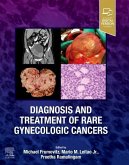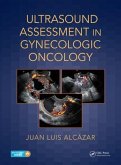50 Big Debates in Gynecologic Oncology
Herausgeber: Chi, Dennis S; Colombo, Nicoletta; Lakhi, Nisha
50 Big Debates in Gynecologic Oncology
Herausgeber: Chi, Dennis S; Colombo, Nicoletta; Lakhi, Nisha
- Broschiertes Buch
- Merkliste
- Auf die Merkliste
- Bewerten Bewerten
- Teilen
- Produkt teilen
- Produkterinnerung
- Produkterinnerung
Presenting over 50 expertly argued debates in controversial areas of management of gynecologic cancers, each debate incorporates recent evidence and clinical trial data and includes global perspectives on management. Topics discussed include perioperative management, screening and prevention, surgical management, immunotherapy and radiation therapy
Andere Kunden interessierten sich auch für
![Diagnosis and Treatment of Rare Gynecologic Cancers Diagnosis and Treatment of Rare Gynecologic Cancers]() Michael Frumovitz (Professor, Gynecologic Oncology, MD Anderson CanDiagnosis and Treatment of Rare Gynecologic Cancers106,99 €
Michael Frumovitz (Professor, Gynecologic Oncology, MD Anderson CanDiagnosis and Treatment of Rare Gynecologic Cancers106,99 €![Ultrasound Assessment in Gynecologic Oncology Ultrasound Assessment in Gynecologic Oncology]() Juan Luis Alcazar (University of Navarra, Pamplona, Spain)Ultrasound Assessment in Gynecologic Oncology131,99 €
Juan Luis Alcazar (University of Navarra, Pamplona, Spain)Ultrasound Assessment in Gynecologic Oncology131,99 €![Principles and Practice of Gynecologic Oncology Principles and Practice of Gynecologic Oncology]() DENNIS CHIPrinciples and Practice of Gynecologic Oncology250,99 €
DENNIS CHIPrinciples and Practice of Gynecologic Oncology250,99 €![Berek and Hacker's Gynecologic Oncology Berek and Hacker's Gynecologic Oncology]() Jonathan S. BerekBerek and Hacker's Gynecologic Oncology182,99 €
Jonathan S. BerekBerek and Hacker's Gynecologic Oncology182,99 €![DiSaia and Creasman Clinical Gynecologic Oncology DiSaia and Creasman Clinical Gynecologic Oncology]() DiSaia and Creasman Clinical Gynecologic Oncology201,99 €
DiSaia and Creasman Clinical Gynecologic Oncology201,99 €![DeVita, Hellman, and Rosenberg's Cancer DeVita, Hellman, and Rosenberg's Cancer]() DeVita, Jr., Vincent T., MDDeVita, Hellman, and Rosenberg's Cancer265,99 €
DeVita, Jr., Vincent T., MDDeVita, Hellman, and Rosenberg's Cancer265,99 €![Pocket Guide to Oncologic Emergencies Pocket Guide to Oncologic Emergencies]() Monica Kathleen Wattana (MD Anderson Cancer Ce University of TexasPocket Guide to Oncologic Emergencies45,99 €
Monica Kathleen Wattana (MD Anderson Cancer Ce University of TexasPocket Guide to Oncologic Emergencies45,99 €-
-
-
Presenting over 50 expertly argued debates in controversial areas of management of gynecologic cancers, each debate incorporates recent evidence and clinical trial data and includes global perspectives on management. Topics discussed include perioperative management, screening and prevention, surgical management, immunotherapy and radiation therapy
Produktdetails
- Produktdetails
- Verlag: Cambridge University Press
- Seitenzahl: 224
- Erscheinungstermin: 3. August 2023
- Englisch
- Abmessung: 234mm x 156mm x 18mm
- Gewicht: 530g
- ISBN-13: 9781108940801
- ISBN-10: 1108940803
- Artikelnr.: 66897686
- Herstellerkennzeichnung
- Libri GmbH
- Europaallee 1
- 36244 Bad Hersfeld
- gpsr@libri.de
- Verlag: Cambridge University Press
- Seitenzahl: 224
- Erscheinungstermin: 3. August 2023
- Englisch
- Abmessung: 234mm x 156mm x 18mm
- Gewicht: 530g
- ISBN-13: 9781108940801
- ISBN-10: 1108940803
- Artikelnr.: 66897686
- Herstellerkennzeichnung
- Libri GmbH
- Europaallee 1
- 36244 Bad Hersfeld
- gpsr@libri.de
Section I: Perioperative Management; 1A. Should routine mechanical bowel
preparation be performed before primary debulking surgery? Yes Lea A.
Moukarzel and Oliver Zivanovic; 1B. Should routine mechanical bowel
preparation be performed before primary debulking surgery? No Shannon
Armbruster and Fidel A. Valea; 2A . Should preoperative carbohydrate
loading be routine prior to debulking surgery? Yes Arwa Mohammad, Deepa
Maheswari M. Narasimhulu and Sean C. Dowdy; 2B. Should preoperative
carbohydrate loading be routine prior to debulking surgery? No Kathryn
Miller, Dib Sassine and Yukio Sonoda; Section II: Screening, Prevention and
Early Diagnosis; 3A. Should women with BRCA mutations be offered bilateral
salpingectomy with delayed oophorectomy for ovarian cancer risk reduction?
Yes Thomas Boerner and Kara Long Roche; 3B. Should women with BRCA
mutations be offered bilateral salpingectomy with delayed oophorectomy for
ovarian cancer risk reduction? No Steven A. Narod; 4A. Can high-risk HPV
testing be used alone as the primary screening modality for cervical
cancer? Yes Thomas C. Wright; 4B. Can high-risk HPV testing be used alone
as the primary screening modality for cervical cancer? No Ibraheem O.
Awowole and Olusegun O. Badejoko; Section III: Ovarian Cancer; 5A. Should
CA-125 surveillance be performed after completion of primary treatment for
ovarian cancer patients in remission? Yes Eseohi Ehimiaghe and Edward
Tanner; 5B. Should CA-125 surveillance be performed after completion of
primary treatment for ovarian cancer patients in remission? No Gordon J. S.
Rustin; 6A. In patients with BRCA-negative and HRD-negative epithelial
ovarian cancer, should molecular profiling be routinely done to guide
adjuvant therapy? Yes Ilaria Betella and Matteo Repetto; 6B. In patients
with BRCA-negative and HRD-negative epithelial ovarian cancer, should
molecular profiling be routinely done to guide adjuvant therapy? No Raanan
Alter and Ernst Lengyel; 7A. Is MEK Inhibitor Therapy the Best Treatment
Recommendation for Low-Grade Serous Ovarian Cancer Patients at First
Relapse? Yes Rachel N. Grisham; 7B. Is MEK Inhibitor Therapy the Best
Treatment Recommendation for Low-Grade Serous Ovarian Cancer Patients at
First Relapse? No David M. Gershenson; 8A. Should Stage IC mucinous ovarian
carcinoma be managed by observation or adjuvant chemotherapy? Observation
Jason D. Wright; 8B. Should Stage IC mucinous ovarian carcinoma be managed
by observation or adjuvant chemotherapy? Adjuvant chemotherapy Jonathan
Ledermann and Sophia Wong; 9A. How many cycles of adjuvant chemotherapy
should be administered to patients with high-risk Stage I epithelial
ovarian cancer? Three cycles Annalisa Garbi, Eleonora Zaccarelli and
Federica Tomao; 9B. How many cycles of adjuvant chemotherapy should be
administered to patients with high-risk Stage I epithelial ovarian cancer?
Six cycles John K. Chan and Daniel S. Kapp; 10A. Patients with advanced
ovarian cancer who are 75 years old and older should routinely be treated
withneoadjuvant chemotherapy: Yes Michelle Davis and Ursula Matulonis; 10B.
Patients with advanced ovarian cancer who are 75 years old and older should
routinely be treated with neoadjuvant chemotherapy: No Olga T. Filippova
and William P. Tew; 11A. Should an attempt at aggressive cytoreduction be
made for all surgical candidates with advanced ovarian cancer prior to
treatment with adjuvant chemotherapy? Yes Sven Mahner, Anca Chelariu-Raicu
and Fabian Trillsch; 11B. Should an attempt at aggressive cytoreduction be
made for all surgical candidates with advanced ovarian cancer prior to
treatment with adjuvant chemotherapy? No Sean Kehoe and Jason Yap; 12A.
Should minimally invasive modalities be routinely/uniformly utilized for
assessment of resectability prior to attempted primary debulking in
patients with advanced ovarian cancer? Yes Juliet E. Wolford
preparation be performed before primary debulking surgery? Yes Lea A.
Moukarzel and Oliver Zivanovic; 1B. Should routine mechanical bowel
preparation be performed before primary debulking surgery? No Shannon
Armbruster and Fidel A. Valea; 2A . Should preoperative carbohydrate
loading be routine prior to debulking surgery? Yes Arwa Mohammad, Deepa
Maheswari M. Narasimhulu and Sean C. Dowdy; 2B. Should preoperative
carbohydrate loading be routine prior to debulking surgery? No Kathryn
Miller, Dib Sassine and Yukio Sonoda; Section II: Screening, Prevention and
Early Diagnosis; 3A. Should women with BRCA mutations be offered bilateral
salpingectomy with delayed oophorectomy for ovarian cancer risk reduction?
Yes Thomas Boerner and Kara Long Roche; 3B. Should women with BRCA
mutations be offered bilateral salpingectomy with delayed oophorectomy for
ovarian cancer risk reduction? No Steven A. Narod; 4A. Can high-risk HPV
testing be used alone as the primary screening modality for cervical
cancer? Yes Thomas C. Wright; 4B. Can high-risk HPV testing be used alone
as the primary screening modality for cervical cancer? No Ibraheem O.
Awowole and Olusegun O. Badejoko; Section III: Ovarian Cancer; 5A. Should
CA-125 surveillance be performed after completion of primary treatment for
ovarian cancer patients in remission? Yes Eseohi Ehimiaghe and Edward
Tanner; 5B. Should CA-125 surveillance be performed after completion of
primary treatment for ovarian cancer patients in remission? No Gordon J. S.
Rustin; 6A. In patients with BRCA-negative and HRD-negative epithelial
ovarian cancer, should molecular profiling be routinely done to guide
adjuvant therapy? Yes Ilaria Betella and Matteo Repetto; 6B. In patients
with BRCA-negative and HRD-negative epithelial ovarian cancer, should
molecular profiling be routinely done to guide adjuvant therapy? No Raanan
Alter and Ernst Lengyel; 7A. Is MEK Inhibitor Therapy the Best Treatment
Recommendation for Low-Grade Serous Ovarian Cancer Patients at First
Relapse? Yes Rachel N. Grisham; 7B. Is MEK Inhibitor Therapy the Best
Treatment Recommendation for Low-Grade Serous Ovarian Cancer Patients at
First Relapse? No David M. Gershenson; 8A. Should Stage IC mucinous ovarian
carcinoma be managed by observation or adjuvant chemotherapy? Observation
Jason D. Wright; 8B. Should Stage IC mucinous ovarian carcinoma be managed
by observation or adjuvant chemotherapy? Adjuvant chemotherapy Jonathan
Ledermann and Sophia Wong; 9A. How many cycles of adjuvant chemotherapy
should be administered to patients with high-risk Stage I epithelial
ovarian cancer? Three cycles Annalisa Garbi, Eleonora Zaccarelli and
Federica Tomao; 9B. How many cycles of adjuvant chemotherapy should be
administered to patients with high-risk Stage I epithelial ovarian cancer?
Six cycles John K. Chan and Daniel S. Kapp; 10A. Patients with advanced
ovarian cancer who are 75 years old and older should routinely be treated
withneoadjuvant chemotherapy: Yes Michelle Davis and Ursula Matulonis; 10B.
Patients with advanced ovarian cancer who are 75 years old and older should
routinely be treated with neoadjuvant chemotherapy: No Olga T. Filippova
and William P. Tew; 11A. Should an attempt at aggressive cytoreduction be
made for all surgical candidates with advanced ovarian cancer prior to
treatment with adjuvant chemotherapy? Yes Sven Mahner, Anca Chelariu-Raicu
and Fabian Trillsch; 11B. Should an attempt at aggressive cytoreduction be
made for all surgical candidates with advanced ovarian cancer prior to
treatment with adjuvant chemotherapy? No Sean Kehoe and Jason Yap; 12A.
Should minimally invasive modalities be routinely/uniformly utilized for
assessment of resectability prior to attempted primary debulking in
patients with advanced ovarian cancer? Yes Juliet E. Wolford
Section I: Perioperative Management; 1A. Should routine mechanical bowel
preparation be performed before primary debulking surgery? Yes Lea A.
Moukarzel and Oliver Zivanovic; 1B. Should routine mechanical bowel
preparation be performed before primary debulking surgery? No Shannon
Armbruster and Fidel A. Valea; 2A . Should preoperative carbohydrate
loading be routine prior to debulking surgery? Yes Arwa Mohammad, Deepa
Maheswari M. Narasimhulu and Sean C. Dowdy; 2B. Should preoperative
carbohydrate loading be routine prior to debulking surgery? No Kathryn
Miller, Dib Sassine and Yukio Sonoda; Section II: Screening, Prevention and
Early Diagnosis; 3A. Should women with BRCA mutations be offered bilateral
salpingectomy with delayed oophorectomy for ovarian cancer risk reduction?
Yes Thomas Boerner and Kara Long Roche; 3B. Should women with BRCA
mutations be offered bilateral salpingectomy with delayed oophorectomy for
ovarian cancer risk reduction? No Steven A. Narod; 4A. Can high-risk HPV
testing be used alone as the primary screening modality for cervical
cancer? Yes Thomas C. Wright; 4B. Can high-risk HPV testing be used alone
as the primary screening modality for cervical cancer? No Ibraheem O.
Awowole and Olusegun O. Badejoko; Section III: Ovarian Cancer; 5A. Should
CA-125 surveillance be performed after completion of primary treatment for
ovarian cancer patients in remission? Yes Eseohi Ehimiaghe and Edward
Tanner; 5B. Should CA-125 surveillance be performed after completion of
primary treatment for ovarian cancer patients in remission? No Gordon J. S.
Rustin; 6A. In patients with BRCA-negative and HRD-negative epithelial
ovarian cancer, should molecular profiling be routinely done to guide
adjuvant therapy? Yes Ilaria Betella and Matteo Repetto; 6B. In patients
with BRCA-negative and HRD-negative epithelial ovarian cancer, should
molecular profiling be routinely done to guide adjuvant therapy? No Raanan
Alter and Ernst Lengyel; 7A. Is MEK Inhibitor Therapy the Best Treatment
Recommendation for Low-Grade Serous Ovarian Cancer Patients at First
Relapse? Yes Rachel N. Grisham; 7B. Is MEK Inhibitor Therapy the Best
Treatment Recommendation for Low-Grade Serous Ovarian Cancer Patients at
First Relapse? No David M. Gershenson; 8A. Should Stage IC mucinous ovarian
carcinoma be managed by observation or adjuvant chemotherapy? Observation
Jason D. Wright; 8B. Should Stage IC mucinous ovarian carcinoma be managed
by observation or adjuvant chemotherapy? Adjuvant chemotherapy Jonathan
Ledermann and Sophia Wong; 9A. How many cycles of adjuvant chemotherapy
should be administered to patients with high-risk Stage I epithelial
ovarian cancer? Three cycles Annalisa Garbi, Eleonora Zaccarelli and
Federica Tomao; 9B. How many cycles of adjuvant chemotherapy should be
administered to patients with high-risk Stage I epithelial ovarian cancer?
Six cycles John K. Chan and Daniel S. Kapp; 10A. Patients with advanced
ovarian cancer who are 75 years old and older should routinely be treated
withneoadjuvant chemotherapy: Yes Michelle Davis and Ursula Matulonis; 10B.
Patients with advanced ovarian cancer who are 75 years old and older should
routinely be treated with neoadjuvant chemotherapy: No Olga T. Filippova
and William P. Tew; 11A. Should an attempt at aggressive cytoreduction be
made for all surgical candidates with advanced ovarian cancer prior to
treatment with adjuvant chemotherapy? Yes Sven Mahner, Anca Chelariu-Raicu
and Fabian Trillsch; 11B. Should an attempt at aggressive cytoreduction be
made for all surgical candidates with advanced ovarian cancer prior to
treatment with adjuvant chemotherapy? No Sean Kehoe and Jason Yap; 12A.
Should minimally invasive modalities be routinely/uniformly utilized for
assessment of resectability prior to attempted primary debulking in
patients with advanced ovarian cancer? Yes Juliet E. Wolford
preparation be performed before primary debulking surgery? Yes Lea A.
Moukarzel and Oliver Zivanovic; 1B. Should routine mechanical bowel
preparation be performed before primary debulking surgery? No Shannon
Armbruster and Fidel A. Valea; 2A . Should preoperative carbohydrate
loading be routine prior to debulking surgery? Yes Arwa Mohammad, Deepa
Maheswari M. Narasimhulu and Sean C. Dowdy; 2B. Should preoperative
carbohydrate loading be routine prior to debulking surgery? No Kathryn
Miller, Dib Sassine and Yukio Sonoda; Section II: Screening, Prevention and
Early Diagnosis; 3A. Should women with BRCA mutations be offered bilateral
salpingectomy with delayed oophorectomy for ovarian cancer risk reduction?
Yes Thomas Boerner and Kara Long Roche; 3B. Should women with BRCA
mutations be offered bilateral salpingectomy with delayed oophorectomy for
ovarian cancer risk reduction? No Steven A. Narod; 4A. Can high-risk HPV
testing be used alone as the primary screening modality for cervical
cancer? Yes Thomas C. Wright; 4B. Can high-risk HPV testing be used alone
as the primary screening modality for cervical cancer? No Ibraheem O.
Awowole and Olusegun O. Badejoko; Section III: Ovarian Cancer; 5A. Should
CA-125 surveillance be performed after completion of primary treatment for
ovarian cancer patients in remission? Yes Eseohi Ehimiaghe and Edward
Tanner; 5B. Should CA-125 surveillance be performed after completion of
primary treatment for ovarian cancer patients in remission? No Gordon J. S.
Rustin; 6A. In patients with BRCA-negative and HRD-negative epithelial
ovarian cancer, should molecular profiling be routinely done to guide
adjuvant therapy? Yes Ilaria Betella and Matteo Repetto; 6B. In patients
with BRCA-negative and HRD-negative epithelial ovarian cancer, should
molecular profiling be routinely done to guide adjuvant therapy? No Raanan
Alter and Ernst Lengyel; 7A. Is MEK Inhibitor Therapy the Best Treatment
Recommendation for Low-Grade Serous Ovarian Cancer Patients at First
Relapse? Yes Rachel N. Grisham; 7B. Is MEK Inhibitor Therapy the Best
Treatment Recommendation for Low-Grade Serous Ovarian Cancer Patients at
First Relapse? No David M. Gershenson; 8A. Should Stage IC mucinous ovarian
carcinoma be managed by observation or adjuvant chemotherapy? Observation
Jason D. Wright; 8B. Should Stage IC mucinous ovarian carcinoma be managed
by observation or adjuvant chemotherapy? Adjuvant chemotherapy Jonathan
Ledermann and Sophia Wong; 9A. How many cycles of adjuvant chemotherapy
should be administered to patients with high-risk Stage I epithelial
ovarian cancer? Three cycles Annalisa Garbi, Eleonora Zaccarelli and
Federica Tomao; 9B. How many cycles of adjuvant chemotherapy should be
administered to patients with high-risk Stage I epithelial ovarian cancer?
Six cycles John K. Chan and Daniel S. Kapp; 10A. Patients with advanced
ovarian cancer who are 75 years old and older should routinely be treated
withneoadjuvant chemotherapy: Yes Michelle Davis and Ursula Matulonis; 10B.
Patients with advanced ovarian cancer who are 75 years old and older should
routinely be treated with neoadjuvant chemotherapy: No Olga T. Filippova
and William P. Tew; 11A. Should an attempt at aggressive cytoreduction be
made for all surgical candidates with advanced ovarian cancer prior to
treatment with adjuvant chemotherapy? Yes Sven Mahner, Anca Chelariu-Raicu
and Fabian Trillsch; 11B. Should an attempt at aggressive cytoreduction be
made for all surgical candidates with advanced ovarian cancer prior to
treatment with adjuvant chemotherapy? No Sean Kehoe and Jason Yap; 12A.
Should minimally invasive modalities be routinely/uniformly utilized for
assessment of resectability prior to attempted primary debulking in
patients with advanced ovarian cancer? Yes Juliet E. Wolford









